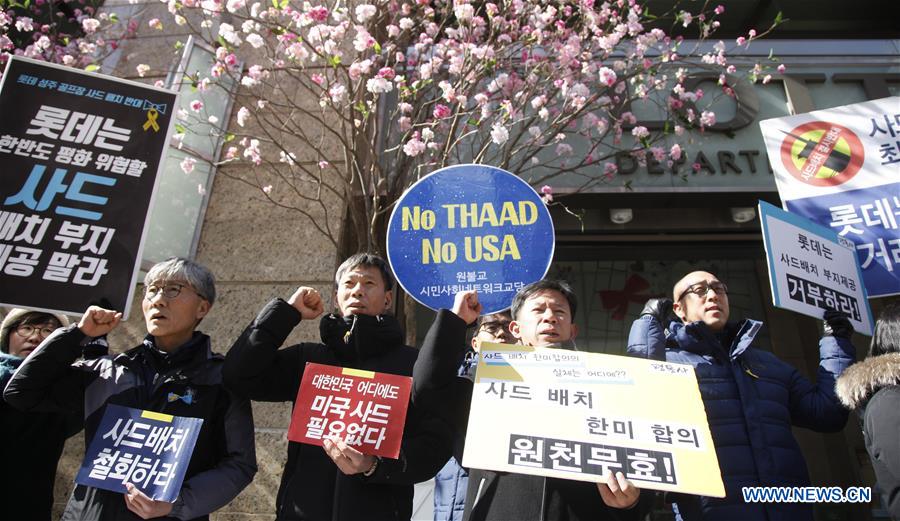SEOUL, Feb. 23 (Xinhua) -- Residents living in South Korea's southeast regions, where the U.S. missile shield is set to be deployed, came up to the capital city Seoul on Thursday to rally against the decision to install one Terminal High Altitude Area Defense (THAAD) battery in their hometown.

Protesters hold posters during an anti-THAAD rally in front of the Lotte department store in Seoul, South Korea, Feb. 23, 2017. In the proposed deal of South Korea's government, a golf course, currently owned by Lotte Group, would be used for the deployment of the U.S. Terminal High Altitude Area Defense (THAAD) anti-missile system, according to media reports. (Xinhua/Yao Qilin)
Setting works for bread and butter aside, tens of locals from the Seongju county and the Gimcheon city in North Gyeongsang province took to the bustling streets in front of the Lotte Department Store near the headquarters of Lotte Group, South Korea's fifth-largest conglomerate.
At a near-zero, windy day, the locals and advocacy group activists chanted for "Stop THAAD" and "We want peace" as the deal to exchange military land for the Lotte-owned golf course can speed up the deployment procedures if it is signed.
Local media speculations say the signing is imminent and that Lotte International, a Lotte Group unit which owns the golf course, the THAAD deployment site, may hold a board of directors meeting within this month to grant a final approval to the land swap contract.
Seoul's attempt to swap military land for the Lotte property was made to skip the process of getting a green light from the National Assembly. If South Korea purchases a new land for military purpose, the parliamentary approval will be required for budget.
The process of hearing opinion from residents was also omitted in the abrupt decision in July last year to install the U.S. missile defense system by the end of this year. The Lotte golf course is located near the border between the Gimcheon city with a population of about 140,000 and the Seongju county of a 45,000 population.
Over seven months have passed since enraged residents began staging a candlelit rally every night, but their fury has not abated. Rather, their worry has deepened over future generations as the THAAD destroys peace and fuels arms race.
As seen in the Anti-Ballistic Missile (ABM) treaty during the Cold War, the United States must have recognized the danger of the missile defense (MD) system, which spawns arms race. Like a fight between spear and shield, more MDs will inevitably lead to more nuclear-tipped ballistic missiles.
"Many of participants in the candlelight vigil are of old age. They come to the streets at a cold winter night on a belief that THAAD must not be placed in our soil in our time for future generations," Kim Jong-kyung, co-chair of the Gimcheon's anti-THAAD committee composed of residents, said in an interview.
The long-drawn-out protest against the THAAD, which the grey-haired chair said would escalate tensions and ruin peace on the Korean Peninsula, increased physical and mental fatigue of the residents.
The chair, however, said he sees a silver lining loom large following the impeachment of President Park Geun-hye over a corruption scandal, which is alleged to have involved multiple chiefs of conglomerates, called chaebol here.
Samsung Electronics Vice Chairman Lee Jae-yong has been taken into custody for bribery charges, while suspicion is being raised on collusive ties between the Park Geun-hye government and Lotte Group.
An arrest warrant for Lotte Group Chairman Shin Dong-bin was rejected in September last year, just before a final announcement to alter the THAAD deployment site into the Lotte-possessed golf course. Lotte regained its duty-free shop license in December despite investigations into bribery.
Kim, the co-chair, fully believed the presidential candidate of the biggest opposition Minjoo Party will be elected next leader after the constitutional court upholds the impeachment motion for Park.
The court is widely forecast to finalize its deliberation before the middle of March, permanently removing the first female leader of South Korea from office. If the impeachment bill is upheld, a presidential election must be held in 60 days.
The power transfer, Kim said, would delay, and eventually nullify, the THAAD deployment under the situations that the impeachment, a political variable, became the decisive factor on all issues.















